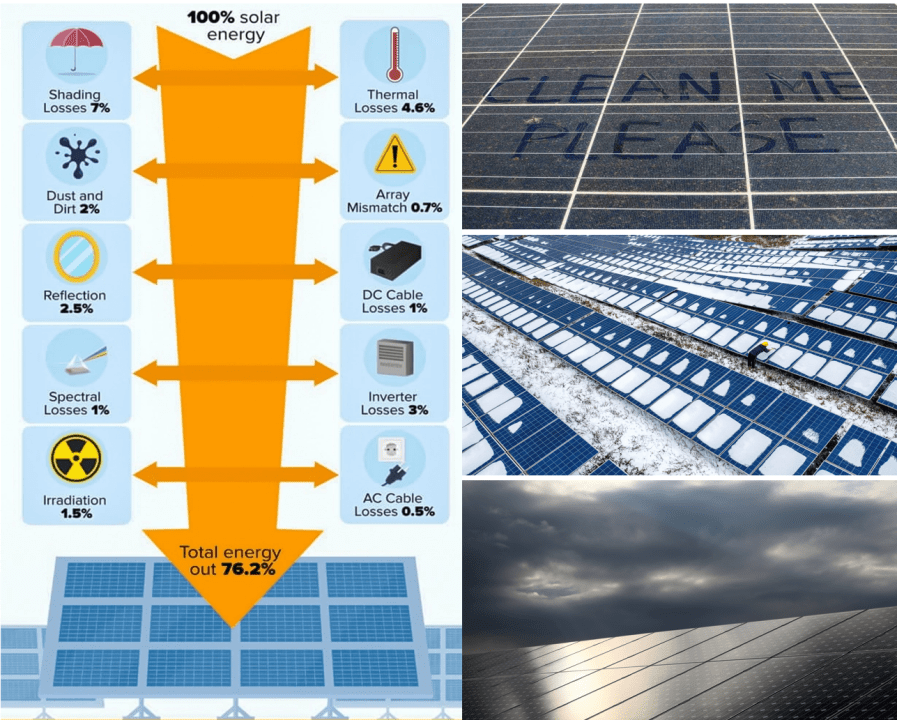Solar power has emerged as a sustainable alternative to conventional sources of energy, such as fossil fuels. The demand for solar energy has increased in recent years due to its ability to reduce carbon emissions and contribute towards a cleaner environment. However, solar power plants face various challenges that can impact their efficiency and output. In this article, we will explore the major challenges faced by solar power plants and discuss ways to overcome them.

Dust and Debris Accumulation
Dust and debris accumulation on solar panels can reduce the efficiency of the solar power plant. The accumulation of dirt and debris can block the sunlight, reducing the power output of the solar panels. Therefore, it is essential to keep the solar panels clean to maintain their efficiency. Regular cleaning of the solar panels can help to remove the dirt and debris and ensure that the panels are functioning at optimal efficiency. In some cases, solar panels can be cleaned using water and soap. However, care should be taken to avoid damaging the panels during the cleaning process.
Weather Conditions
Solar panels can be damaged by severe weather conditions such as storms, snow, and high winds. These weather events can cause physical damage to the panels, which can reduce their efficiency and lifespan. Therefore, it is important to design solar power plants with the local weather conditions in mind. For example, if the region experiences frequent storms or high winds, the solar panels should be designed to withstand these conditions. Similarly, if the region experiences heavy snowfall, the solar panels should be tilted at an angle to prevent snow accumulation.
Inverter Failures
Inverters are an important component of solar power plants that convert DC power from the solar panels to AC power that can be used by homes and businesses. Inverter failures can impact the efficiency of the solar power plant. Inverters can fail due to various reasons, such as electrical surges, lightning strikes, thermal stress, and component failures. Therefore, it is essential to choose high-quality inverters and regularly inspect them to ensure that they are functioning properly. In case of any issues, prompt repairs or replacements should be made to minimize downtime and maintain efficiency.
Solar Panel Degradation
Solar panels can degrade over time due to exposure to UV radiation fluctuations and other weather factors. This degradation can reduce the efficiency of the solar power plant and eventually lead to the need for replacement. Therefore, it is essential to choose high-quality solar panels that are designed to withstand the local weather conditions. Additionally, regular inspections and maintenance can help identify any issues and prevent downtime.
Maintenance
Regular maintenance is essential to maintain the health of the solar power plant. Any defect in the solar panel or other components should be promptly repaired or replaced to ensure the plant is running at maximum efficiency. Therefore, it is important to schedule regular maintenance checks to identify any issues and take corrective actions promptly.
Grid Failures or Outages
Grid failures or outages can increase the downtime of the solar power plant and impact its overall efficiency. Therefore, it is essential to have backup systems in place to ensure that the solar power plant can continue to operate even during a grid failure or outage. Backup systems such as batteries can be used to store excess power generated by the solar panels, which can be used during a grid failure or outage.
High Temperature, Cloudy Weather, and Shading
High temperature, cloudy weather, and shading due to nearby objects or trees can reduce the efficiency of the solar panels. Solar panels work best in direct sunlight, and shade can impact their performance. Therefore, it is important to design solar power plants with the local weather conditions in mind. The orientation of the solar panels, along with the tilt angle, can be adjusted to maximize the amount of sunlight that reaches the panels. Additionally, any nearby objects or trees that cause shading should be removed to maximize the amount of sunlight that reaches the panels.
Proactive Monitoring
Proactive monitoring is essential to identify any issues with the solar power plant promptly. Monitoring the performance of the solar panels, inverters, and other components can help to identify any potential issues and take corrective actions before they impact the overall efficiency of the plant. Various monitoring systems are available that can provide real-time data on the performance of the solar power plant, which can be used to optimize its efficiency.
System Design
The design of the solar power plant can impact its efficiency and output. Factors such as the orientation of the solar panels, tilt angle, sizing of string power cables, and inverter overloading can impact the overall performance of the solar power plant. Therefore, it is important to design solar power plants with the local weather conditions and other factors in mind. The design should be optimized to maximize the efficiency and output of the solar power plant.
Ageing of Equipment
The ageing of equipment is a natural process that can impact the efficiency of the solar power plant. As the equipment ages, its performance can decline, and it may need to be replaced to maintain the overall efficiency of the plant. Therefore, it is essential to schedule regular inspections and maintenance checks to identify any potential issues and take corrective actions promptly.
Conclusion
Solar power has emerged as a sustainable alternative to conventional sources of energy. However, solar power plants face various challenges that can impact their efficiency and output. These challenges include dust and debris accumulation, weather conditions, inverter failures, solar panel degradation, maintenance, grid failures or outages, high temperature, cloudy weather, and shading, proactive monitoring, system design, and ageing of equipment. By addressing these challenges proactively, solar power plants can maintain their efficiency and contribute towards a cleaner environment.
Contributed by
Shree Yerramsetti and
Yatin Bhoite 

